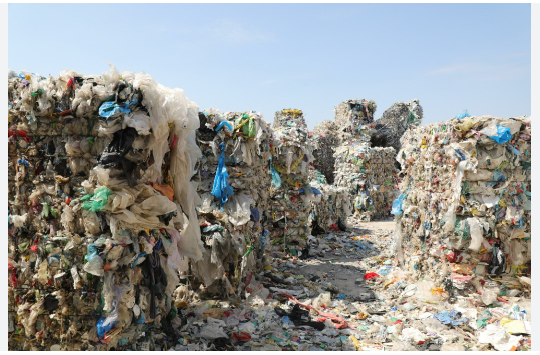Marga Zambrana from Equal Times explores an ugly subject, which makes a significant contribution to environmental pollution in Turkey. Turkey has become Europe’s trash bin. “In 2021, Europe exported 33 million tonnes of waste, almost half of which went to Turkey, twice as much as before the Chinese ban” she states. “Research shows that only nine per cent of the plastic produced to date can be recycled,” Gözde Sevinç, project development officer at Greenpeace Turkey, tells Equal Times. The remaining 90 per cent ends up in illegal landfills on beaches, in rivers, in fields and, consequently, in vegetables and seafood”.
‘Waste colonialism’: this is how activists and scientists characterise the export of rubbish from the European Union to its main buyer Turkey. This waste, which has serious consequences for human health and the environment, has proven difficult to sweep under the rug as its journey is a round trip: Turkey contributes to 16 per cent of the plastic pollution in the Eastern Mediterranean. Toxic substances from this waste end up in the food that is consumed inside and outside of Turkey.
While plastic represents the primary environmental and health hazard amongst the European waste that Turkey receives, it accounts for only 4 per cent – or 400,000 tonnes – of a total of 14 million tonnes of waste. The rest is made up of scrap metal (13 million tonnes) and paper (400,000 tonnes). Turkey, it should be noted, is also one of the world’s leading producers of plastic.
Turkey’s geographical proximity to Europe and its common membership within the Organisation for Economic Co-operation and Development (OECD) combined with its lax environmental policies have led the country to become the EU’s dumping ground since China banned plastics imports in 2018.
In 2021, Europe exported 33 million tonnes of waste, almost half of which went to Turkey, twice as much as before the Chinese ban.
This is a problem of global proportions: the world’s most developed countries – including the United States, Canada, Japan, the United Kingdom and the EU countries, all of which have strict environmental policies themselves – send their waste to emerging economies such as Turkey, Malaysia, Indonesia and Vietnam. The planet is becoming inundated with plastic waste, one of the main obstacles to curbing climate change.
In addition to plastic from the EU, Turkey received 122,898 tonnes of plastic waste from the UK, accounting for 27 per cent of UK plastic exports. At the same time, Turkey is the second largest manufacturer of plastics in Europe (behind only Germany) and the seventh largest in the world, producing around 10 million tonnes per year, according to 2021 data from PAGEV, the plastics sectoral organisation in Turkey.
Research by the UK NGO Environmental Investigation Agency revealed that Turkey generated 3.9 million tonnes of domestic plastic waste in 2021 while importing a total of 682,208 tonnes.
“The fact that Turkey continues to buy plastic waste from the EU while producing so much plastic itself is due to the growth of the recycling sector. But there’s also another problem here. Research shows that only nine per cent of the plastic produced to date can be recycled,” Gözde Sevinç, project development officer at Greenpeace Turkey, tells Equal Times. The remaining 90 per cent ends up in illegal landfills on beaches, in rivers, in fields and, consequently, in vegetables and seafood.
“The EU sends the worst of its waste to Turkey, without any concern for environmental factors or working conditions [of recycling workers]. This is what we call waste colonialism,” says Kıvanç Eliaçık, head of the international relations for DISK, the Confederation of Revolutionary Trade Unions of Turkey.
Follow our English language YouTube videos @ REAL TURKEY: https://www.youtube.com/channel/UCKpFJB4GFiNkhmpVZQ_d9Rg
And content at Twitter: @AtillaEng
Facebook: Real Turkey Channel: https://www.facebook.com/realturkeychannel/
